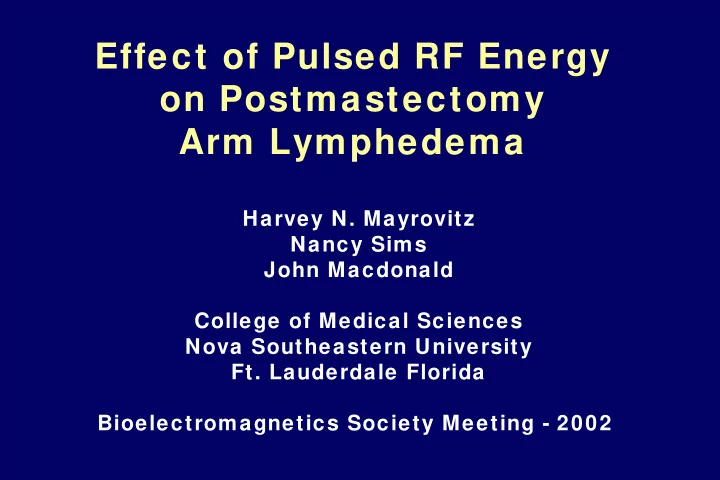

Effect of Pulsed RF Energy on Postmastectomy Arm Lymphedema Harvey N. Mayrovitz Nancy Sims John Macdonald College of Medical Sciences Nova Southeastern University Ft. Lauderdale Florida Bioelectromagnetics Society Meeting - 2002
BEMS BUDDIES In Quebec Marco Markov Art Pilla
Lymphedema • High protein content edema secondary to node removal and/or radiation therapy • Occurs in 20-40% of postmastectomy w omen from months to years after surgery • Usually progressive if untreated - Fibrosis
Treatment Complex Decongestive Therapy (CDT) • Manual Lymph Drainage • Compression Bandaging • Exercise and Skin Care
Current Study Rationale • CDT promotes lymph drainage Expands collateral channels Provides alternative pathw ays • Pulsed RF (PRFT) Increases skin blood flow (SBF) via Vascular channel enlargement HYPOTHESIS PRFT affects lymph channels similarly to blood channels
Deep Pathw ays Normal Superficial
“Substitutution” Pathw ays Takeover requires a “kick-start” Pulsed Pulsed RF RF S to D
Objectives Pilot study to Investigate effects of Pulsed RF Therapy (PRFT) on Arm Lymphedema Volume Skin Blood Perfusion Transcutaneous Oxygen
Subjects and Protocol • Seven post-mastectomy patients in pilot study • Unilateral Lymphedema All had prior CDT Tx • Each Pt. treated 4-6 times over 2-w eeks • During this interval no other Tx provided
Study Treatments • Each Tx for 60 minutes • Tx heads (Magnatherm) covered affected arm Dual Tx Dual Tx Heads Heads • Pulsed RF (27.12 MHz) On: 150 sec Off: 1275 sec (700/sec) • Pow er: ~ 12% of max
Physiological Measurements • Skin blood perfusion (SBF) by laser-Doppler SBF on affected arm PO2 • Transcutaneous O 2 (PO2) on affected and contralateral arm PO2
Volumes and Calculations Affected (A) & Control (C) arms measured before Tx and prior to each subsequent Tx • Circumferences (c 1 , c 2 ) at 4-cm intervals • Segmental volumes Vseg=(L/12 )(C 1 2 +C 2 2 +C 1 C 2 ) • Total arm volume V T = sum of segments • Edema volume V TA - V TC • Percent Edema %Edema= Edema Volume / V TC
Results
Edema Volume 0 .9 N=7 N=7 Decreased 0 .8 Edema Volume (L) Further After one Tx 0 .7 Reduction 0 .6 Through 0 .5 4 th Tx * 0 .4 * * * 0 .3 0 .2 0 .1 0.64 0.50 0.42 0.41 0.35 0 .0 0 1 2 3 4 Tre at me nt s * p< 0.0 1 vs. initial ede ma volume
Percent Edema 35 After 4 Tx N=7 N=7 Percent Edema (%) 30 % edema w as ~ 1/2 of 25 pre-Tx level 20 * 15 * * * 10 5 24.5 18.5 15.8 15.3 12 .5 0 0 1 2 3 4 Trea tme nts * p< 0 .0 1 vs. initial %edema
Example SBF Response 4.5 SBF (a.u.) SBF Increased Mean Pulsatile 0.5 BASE ACTIVE OFF 10” 60” 20”
Overall SBF Response 9 0 0 N=7 * * Each 4 Tx * 7 0 0 SBF (a.u.) * 5 0 0 * ~30 minutes 3 0 0 Treatment 1 0 0 0 10 20 30 40 50 60 70 Time (minutes)
PO 2 Response 9 5 N=7 Initial Tx 9 0 A ffe c t e d No initial difference TcPO 2 (mmHg) C o n t ro l No change w ith Tx 8 5 8 0 7 5 7 0 6 5 6 0 5 5 0 1 0 2 0 3 0 4 0 5 0 6 0 Treatment Time (minutes)
Conclusions: Volume Changes • PRFT show s potential benefit • Lymphedema reduced w ith one treatment • Initial PILOT findings are encouraging, BUT need placebo controlled studies (Ongoing)
Conclusions: Blood Perfusion • PRFT associated w ith SBF increase No effect on PO 2 (Normal levels) • Relation of SBF increase to lymphedema reduction (if any) not established • SPECULATION Mechanisms similar to those that increased SBF also increase lymph drainage Expanding collateral channels Increasing lymphoangiomotoricity
Magnatherm Affected PRFT Before Tx for 3 w ks PRFT 3 Sham + 6 Active Affected After PRFT TT 0-300
LDI PERFUSION CHANGES WITH PRFT Baseline 0-4 5-9 Magnatherm P=12, R=3, 30” 10-14 20-24 25-29 0-700 pu
DIFFERENTIAL LDI PERFUSION WITH PRFT 0-4 5-9 10-14 15-19 20-24 25-29
Recommend
More recommend